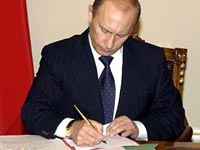Putin appoints new ministers but holds key positions open
Russia President Vladimir Putin has named a new government, appointing new economics and health ministers but retaining his foreign and defense ministers and nearly all other Cabinet officers as part of an expected but largely cosmetic political shuffle before crucial elections.

The new government comes just over a week after Viktor Zubkov, an obscure Cabinet official who had overseen money laundering investigations, became prime minister in a move that surprised most Kremlin experts and stoked speculation about Putin's successor.
Despite the announcement of new ministers Monday, the changes were largely superficial and observers said major policy shifts of any sort were unlikely before parliamentary elections in December and a presidential vote in March.
"It is my great hope that the Russian government under the leadership of a new prime minister will strive to solve what we consider to be the strategic tasks of the country's development," Putin said in televised comments.
"In this crucial time, it's necessary not only to ensure stable work but also energetically promote the implementation of our strategic plans and to resolve the pressing everyday problems facing the citizens of Russia," he said.
Putin said that economics minister German Gref had been replaced with his first deputy, Elvira Nabiullina. Health minister Mikhail Zurabov was replaced by Finance Ministry official Tatiyana Golikova.
Both outgoing ministers are widely unpopular among leftist lawmakers and large sections of Russians - Gref for his pro-Western, free-market economic reforms, Zurabov for changes in how social benefits were paid out to the elderly, the disabled and veterans.
Foreign Minister Sergey Lavrov retained his post and Putin rejected the resignation of Defense Minister Anatoly Serdyukov, who Zubkov announced last week would step down because he is married to Zubkov's daughter. Finance Minister Alexei Kudrin was given more responsibility as deputy prime minister, joining two others - Sergei Naryshkin and Alexander Zhukov.
Also losing his job was Regional Development Minister Vladimir Yakovlev, who was replaced by Dmitry Kozak, Putin's chief envoy to the southern federal district. The district includes Chechnya and other parts of the troubled North Caucasus region.
The announcement ended a period of expectation that was unusual even by the murky standards of Kremlin politics. Most news media and Kremlin watchers - who were caught off-guard by Putin tapping Zubkov to be premier 12 days ago - had expected an announcement about the new government Friday, when Zubkov and Putin met at the president's Black Sea resort home.
Analyst Stanislav Belkovsky told Ekho Moskvy radio the new ministers both have a "technical, professional character," which he said signaled an effort to fight corruption and strengthen financial controls over government policy - an effort underlined by Zubkov after his nomination by Putin.
Political observer Alexander Golts said most of the key changes - the sacking of Gref and Zurabov, in particular - were fully expected and because the new ministers are either deputies or members of the outgoing government, no real change in policy should be expected.
"All these changes have a strictly cosmetic character," he said.
He said the shuffle was being made with the December parliamentary elections in mind but it was hard to know what precisely the Kremlin has in mind.
"In as much as we live in a completely closed political system, it's very difficult to know how exactly to receive this information," he said.
Speculation has been building about plans for Putin, who is wildly popular among Russians and who is barred by the constitution from running for a second, consecutive term as president. Before the surprise dissolution of the government of Mikhail Fradkov on Sept. 10, Kremlin observers had been watching closely for signs of who might be the favored candidate to replace him.
Most observers considered the government's two first deputy prime ministers - former Defense Minister Sergei Ivanov and natural gas monopoly Gazprom chairman Dmitry Medvedev - to be the front-runners to become prime minister and therefore become front-runners for the presidency.
However, Putin tapped Zubkov, a Soviet-era state farm director and Communist Party official who has kept a low profile in six years heading Russia's anti-money-laundering agency, to be the new prime minister. That stamp of approval vaulted Zubkov to a prominent position in the race.
Both Ivanov and Medvedev retained their posts in the new government.
And in a noticeably populist move designed to appeal to Russia's sizable population of pensioners, Putin read out the new Cabinet posts only after announcing that all pensions nationwide would be increased as of Oct. 1 - responding to persistent grumbling among elderly Russians that the pensions are miserly.
Subscribe to Pravda.Ru Telegram channel, Facebook, RSS!


